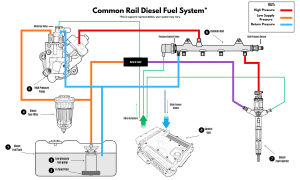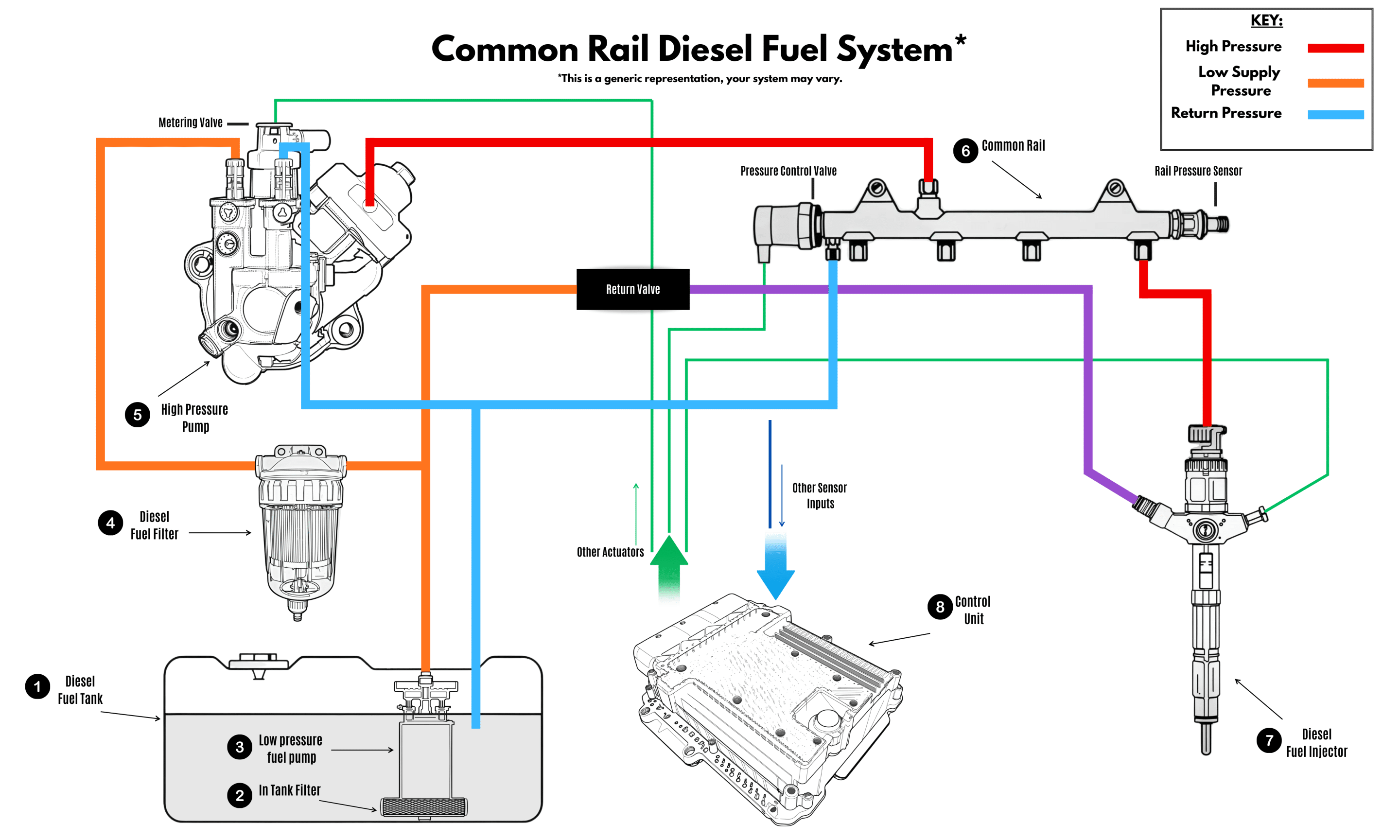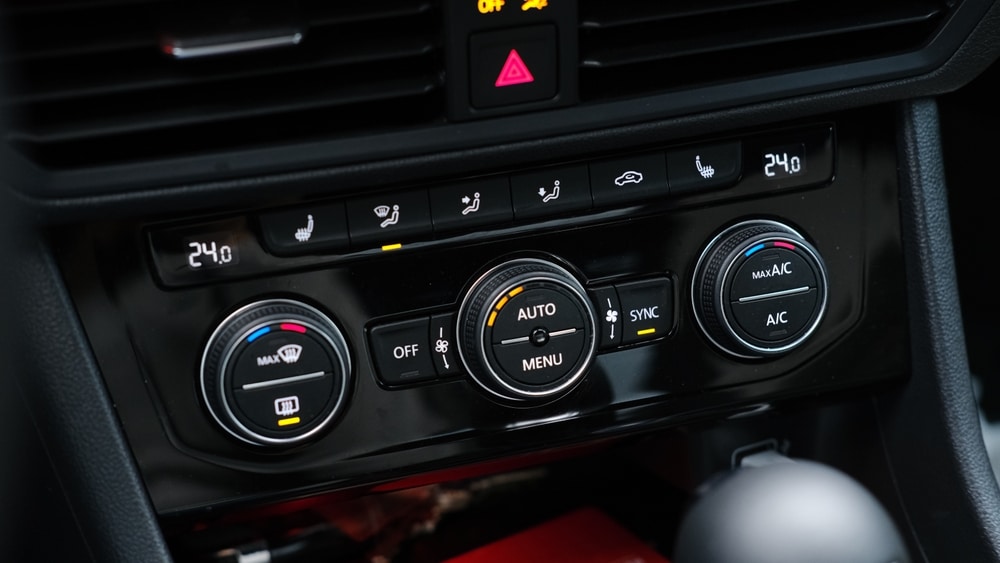Understanding Your Diesel Fuel System
A fault in your diesel fuel system is more than a nuisance; it can quickly lead to repairs that cost thousands.
This vital system ensures the exact amount of diesel is delivered to your engine at the precise time for combustion to take place. Without it, your vehicle wouldn’t run at all.
Modern diesel fuel systems are highly advanced. They control fuel delivery with remarkable accuracy, giving today’s diesels their strength, efficiency, and long life.
But there’s a catch.
Since your diesel fuel system works under immense pressure, even seemingly minor issues like skipping a diesel fuel filter replacement to save a few quid or accidentally putting petrol in the tank can cause significant damage.
In this article, you’ll discover how your diesel fuel system works, the issues you could face if servicing is missed, and how regular maintenance helps you avoid repair bills that could cost thousands.
Are you unsure when your diesel fuel system was last checked? Call 01458 250570 to book a service at Shires Garage, Langport, today.
How Your Car’s Diesel Fuel System Works
There are several types of diesel fuel systems, but in most modern vehicles, you’ll find what’s called a common rail diesel fuel system.
Although designs vary between makes and models, the principle remains the same: a high-pressure rail delivers fuel to all the injectors, ensuring a steady supply and precise control over injection timing.
This system is split into two key parts:
- Low-pressure side: Fuel is pumped from the tank, passed through filters, and then sent toward the high-pressure pump. The goal is to ensure the pump receives clean fuel, free from water and debris, at the right supply pressure.
- High-pressure side: The high-pressure pump then boosts the pressure dramatically and feeds the fuel into the common rail, which stores it under pressure before the injectors atomise it into the engine cylinders at the perfect moment for combustion.
In simple terms, the diesel fuel system ensures your engine gets a consistent flow of clean, pressurised fuel to keep it running smoothly.
Wondering which system your vehicle uses? Our team at Shires Garage, Langport can confirm this during a routine service – call 01458 250570 today.
Diesel Fuel System in Detail – A Closer Look
Now that you’ve seen the overall picture, let’s break down the diesel fuel system into its main components. Each one has a distinct role, and together they keep your engine running reliably.

The Low-Pressure Diesel Fuel System Stage
Fuel Tank & Low-Pressure Fuel Pump
The process begins in the fuel tank (part 1 of image). From here, a low-pressure pump (part 3 of image) pushes diesel towards the high-pressure stage, ensuring a steady flow of diesel for the rest of the system.
Diesel Fuel Filter
Before the diesel reaches more critical parts, it passes through one or more filters (parts 2 and 4 of image). These remove debris and separate out water, which naturally occurs in diesel. Both can cause costly problems if allowed into the system.
High-Pressure Diesel System Explained
High-Pressure Pump
Once the fuel has been filtered, it enters the high-pressure pump (part 5 of image). This component raises the pressure to the extremely high levels required for injection into the engine.
Metering and Pressure Control Valves
Two key valves ensure your diesel fuel system runs correctly:
- The metering valve regulates how much fuel enters the high-pressure stage.
- The pressure control valve keeps the common rail supplied at the right pressure for the engine’s requirements.
Fuel Rail
Under high pressure, the fuel rail (part 6 of image) acts like a storage reservoir. It keeps the supply stable and distributes diesel evenly to each injector.
Diesel Injectors
Finally, the injectors take over (part 7 of image). With nozzle holes as fine as a human hair, they spray the fuel into the engine as a fine mist at precisely the right moment.
Key Features That Make the Diesel Fuel System Special
What makes the diesel fuel system special is how it delivers fuel and how precisely it does so to protect performance and efficiency.
A few features set the diesel fuel system apart:
- Precision under pressure: By combining low-pressure supply with extremely high-pressure delivery, the system can send the right amount of diesel in fractions of a second, ensuring efficient combustion.
- Vulnerability to contamination: Because the system is so precise, even a trace of dirt or water can cause damage. Regular filter changes and using quality diesel are key to protecting it.
- Accurate engineering: Every component, from the pumps and filters to the injectors, is finely built to deliver the correct amount of fuel at exactly the right time. This results in smoother running, better fuel economy, and reliable performance.
Looked after correctly, the system keeps your engine dependable and efficient. If neglected, minor issues can turn into big repair bills – and that’s the last thing you want for your diesel vehicle.
What Happens If Your Diesel Fuel System Is Neglected
Since your diesel fuel system works under very high pressure and demands accuracy, even small lapses in servicing can quickly create major issues. Common risks include:
- Missed filter changes: Diesel filters trap dirt and separate water that naturally exists in fuel. If they aren’t replaced, debris and water can circulate, damaging pumps and injectors throughout the system.
- Low-grade fuel: Poor-quality diesel often carries higher levels of water and impurities, which speed up corrosion in the high-pressure pump, rail, and injectors.
- Chain reaction damage: Once contamination is present, it moves through the entire system. Simply replacing one part doesn’t solve the problem – the damage continues unless the root cause is dealt with.
By sticking to your vehicle’s maintenance schedule and having your fuel filter replaced on time, you can save yourself thousands in future repair costs.
Which is relatively cheap compared to a complete system repair.
Another problem drivers sometimes face is misfuelling. Adding petrol can cause critical parts to seize because petrol lacks the lubrication diesel has. Even starting the engine for a millisecond can harm the injectors and high-pressure pump.
If this happens, the safest response is to avoid starting the car and arrange professional help straight away.
Protecting Your Diesel Fuel System Effectively
Your diesel fuel system is powerful and precise. When it’s well-maintained according to the manufacturer’s guidelines, it works in the background to keep your engine strong and reliable.
But if it’s neglected or misfuelled with petrol, serious faults can appear quickly, leading to costly repairs – a problem nobody wants to have.
The good news is that protecting the system doesn’t have to be complicated. Following the service schedule in your vehicle handbook, replacing diesel fuel filters at the recommended intervals, and filling up with quality fuel are straightforward steps that make a big difference.
By keeping on top of maintenance now, you reduce the chances of bigger problems later on.
For peace of mind, book your diesel service with Shires Garage, Langport, today. Call 01458 250570 to arrange your appointment.
Why Drivers Choose Shires Garage, Langport
When it comes to looking after your diesel fuel system, choosing the right garage makes all the difference. Here’s why so many local drivers rely on Shires Garage:
- Expert servicing and repairs for all diesel vehicles.
- A courtesy car is available to keep you on the road while we work on your vehicle.
- Friendly, local garage trusted by drivers across Langport and Taunton.
- 12-month parts and labour guarantee for added reassurance.
We’re proud to be backed by a {{average-rating}}⭐ Google rating from {{review-count}} happy customers in Langport. That means you can book your diesel service with Shires Garage knowing you’re in safe hands.
FAQ: Diesel Fuel System
- What are the main causes of fuel system damage?
Damage often comes from delaying filter replacements, using poor-quality diesel, water getting into the system, or misfuelling with petrol. Even tiny particles or small amounts of water can spread throughout the system and cause lasting harm to pumps and injectors. - How does a diesel fuel system work?
While designs vary between vehicles, most modern diesels use a common rail system. In this setup, fuel is first moved at low pressure from the tank, through pumps and filters, to the high-pressure pump. The pump then compresses the fuel to the high levels needed for combustion. From there, it enters the fuel rail — a pressurised reservoir — before being injected into the cylinders at the right time to power the engine. - Why is diesel fuel system maintenance essential?
Regular servicing is essential because dirt, water, or even natural wear can cause problems within the system. Replacing the diesel fuel filter at the intervals in your handbook helps protect pumps and injectors from harmful contamination. Skipping this step can lead to corrosion or blockages, both of which are far more expensive to fix. - What happens if petrol is added to a diesel vehicle?
Petrol doesn’t provide the lubrication that diesel does. If petrol enters the system, it can quickly damage the high-pressure pump and injectors. Even starting the engine once can push petrol through the fuel lines, rail, and injectors, making the damage worse. The safest response is not to start the car and to arrange for a professional to drain and check the system. - How much does it cost to repair a diesel fuel system?
The cost depends on the vehicle, the fault, and how much damage has occurred. A simple filter change is inexpensive, but if contamination reaches the injectors or high-pressure pump, repairs become much more complex and costly. Preventative servicing is a far cheaper and safer option.
Still have questions about your diesel fuel system? Call Shires Garage, Langport on 01458 250570 and our experts will be happy to help.



